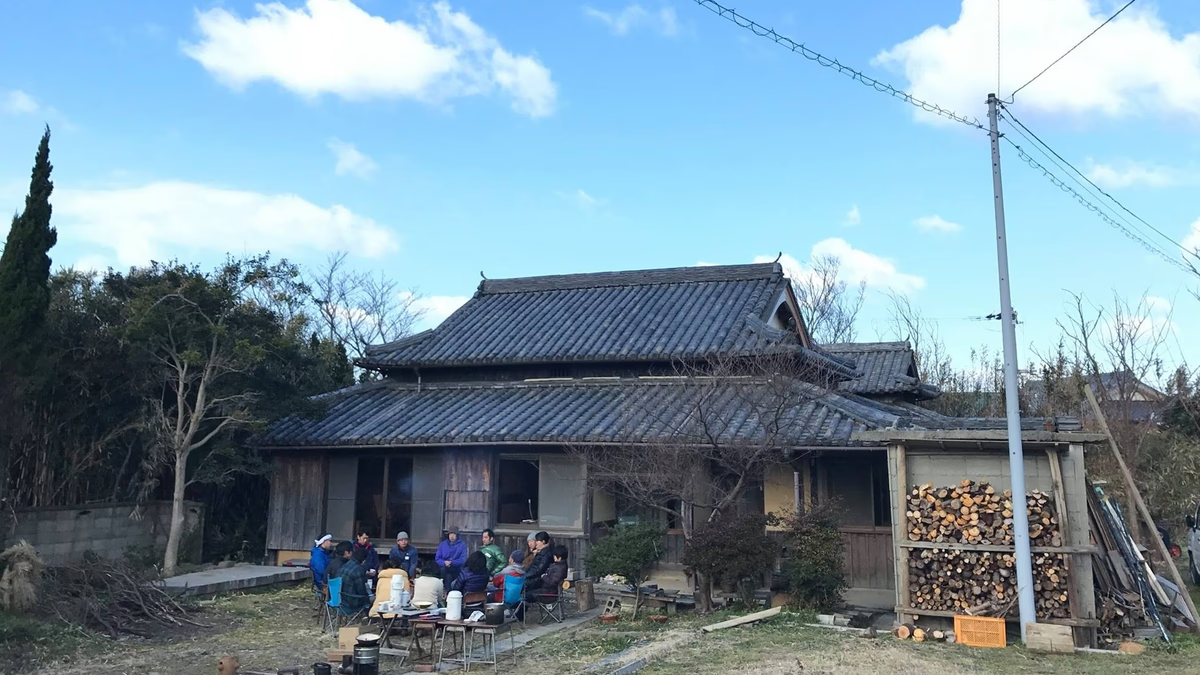みなさんこんにちは、WORK101の原澤です。
新型コロナウイルス感染拡大防止のための自粛も徐々に解除されていっていますが、自粛前と後では私たちのはたらき方やそれに関わる価値観は大きく変わっていると思います。こういった状況でありながら「はたらく文化探求」をテーマにしている私たちWORK101が今やるべきことはなんだろうと、日々悶々と考えていました。
そこで、このものさすサイトを発信の場として、私・原澤が気になるはたらき方をされている方にインタビューを行い、その様子を対談形式で記事にまとめていこうと思い立ったのです。
第一回目の今回は、淡路島を拠点にオンライン・ファシリテーターとして活躍されている青木将幸さんにインタビューをしてきました。ファシリテーターって?なぜ淡路島?どんなはたらき方?など、聞きたいことが盛りだくさんのインタビューとなりました。
インタビューには、ものさすサイトの企画に関わってくれている、ライターの杉本恭子さんも京都から同席。「うんうん」と首を振りながら一緒に聞いてくれていました。
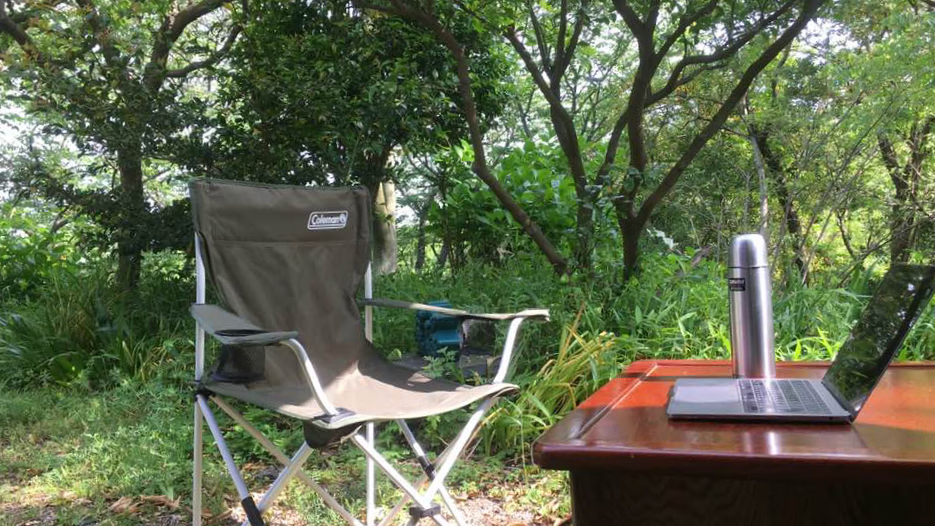
青木さんがインタビューを受けていた場所。緑に囲まれていて気持ちがよさそう。
青木さんが教えてくれた
「インタビュー3つのルール」
ーー新型コロナウイルス感染拡大の影響で在宅ワークが推奨されるなど社会状況が変化しています。そんななかで「WORK101」としてできることを考えていたのですが、我々の今を発信する場である「ものさすサイト」で、働き方についてのインタビューをしていくのがいいのではないかと思いました。そこで、記念すべき第一回を、青木さんにお願いしました。
青木:大変うれしく思います。ありがとうございます。1回目なんて。
ーー今日は主に青木さんの働き方に関して、色々とお話を聞かせていただければと思っています。
青木:インタビューをはじめるにあたって、こちらからこんな事を言うのは大変恐縮なんですが、「インタビューの3つのルール」というのがあります。採用するかは置いておいて小ネタとして……。
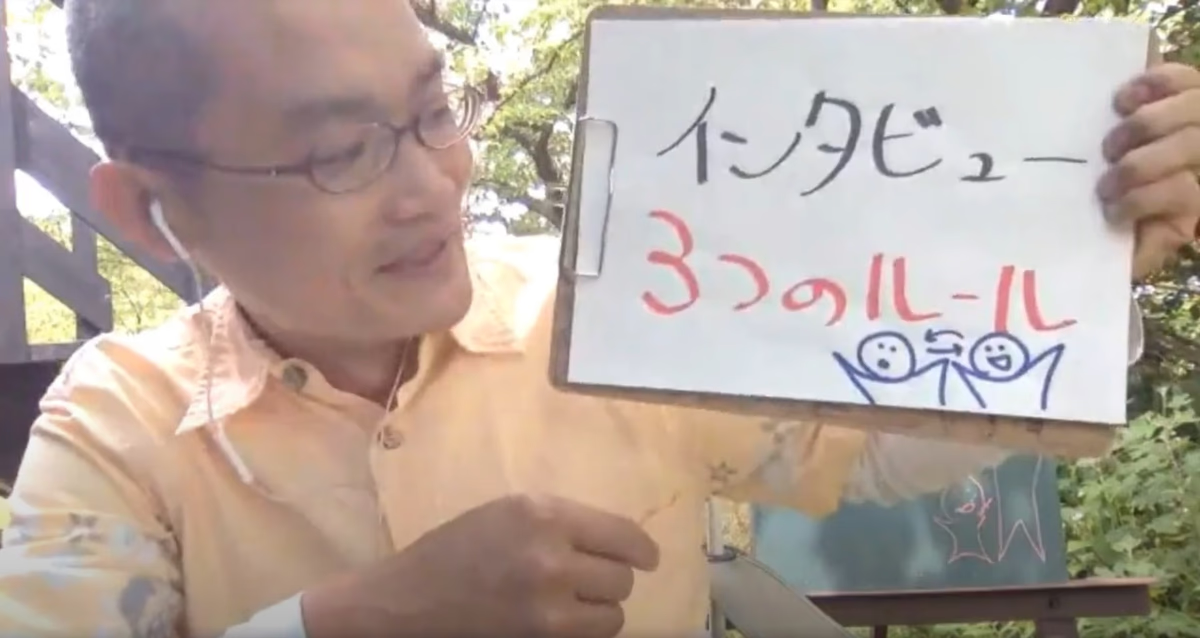
伝えたいことを画用紙に書いて見せてくれる青木さん。
青木:1つめは「何を聞いてもいいよ」ということ。僕に関して何を聞いてもいいんだと思って聞いてくだされば、僕も喜んで話ができます。2つめは「言いたくないことは言わなくてもいい」。これで、語り手の自由と聞き手の自由、両方の自由を確保します。3つめは「聞かれてないのに話してもよい」。インタビューって聞かれたことに答えるという構造になりがちですけど、むくむくっと湧いてきたら自由に話してもいいんじゃないの?ということです。以上が、僕のインタビューの師匠、加藤哲夫さんに教わったルールです。参考にしていただければ。
ーー今の話を聞けて、改めて第1回目が青木さんでよかったなあと思いました。
社会の仕組みは「受け入れる」より「自分で作る」ほうが面白い
ーーまず最初に、青木さんご自身のことについて聞きたいです。ご出身はどこですか?
青木:熊野といって、和歌山県と三重県の県境、紀伊半島の南側の熊野古道という古い参詣道があるあたり。新宮市で生まれて、三重県南牟婁郡の鵜殿村という小さな村で育って、和歌山県と三重県の間を行ったり来たりですね。
ーーそして今は淡路島を拠点としてファシリテーターの仕事をされていますよね。その仕事を目指すきっかけは何だったのでしょうか?
青木:実家には高校三年生までいて、大学で東京に出ました。環境問題にすごく関心があったので、環境系のことが勉強できるところに行こうと、東京農工大学農学部環境・資源学科に進んだんです。でも、意外と授業はつまんなくて。自分で動いた方が面白いんじゃないかと思い、大学1〜2回生の頃には、授業とは別に環境系NGOとか環境問題のボランティアグループなどの社会活動に入っていきました。
ーー授業はおもしろくなかったんですか?
青木:おもしろくなかったですね。どこの大学でも面白い授業ってほとんどないかと思うんですけど、思ったより期待はずれだった感じはある。
唯一面白かったのはある先生が「そんなにつまんないなら自分たちで面白い授業作ったら?」って、1年生後期の授業を作らせてくれたんですね。自分らが勉強したい環境問題の項目を決めて、学校の外からゲストを呼んできて、環境省の人、NGOの人、環境のことをやってる企業の人というふうにオムニバス形式でいろんな講師をアテンドして授業をつくったんです。「あ、授業を受けるのは面白くないけど、つくるのはおもしろいな」と思いました。
社会とか世の中もそうだと思っていて、社会の仕組みをそのまま受け入れていくのはつまんないけど、自分で作っていくのは面白いんだよね。
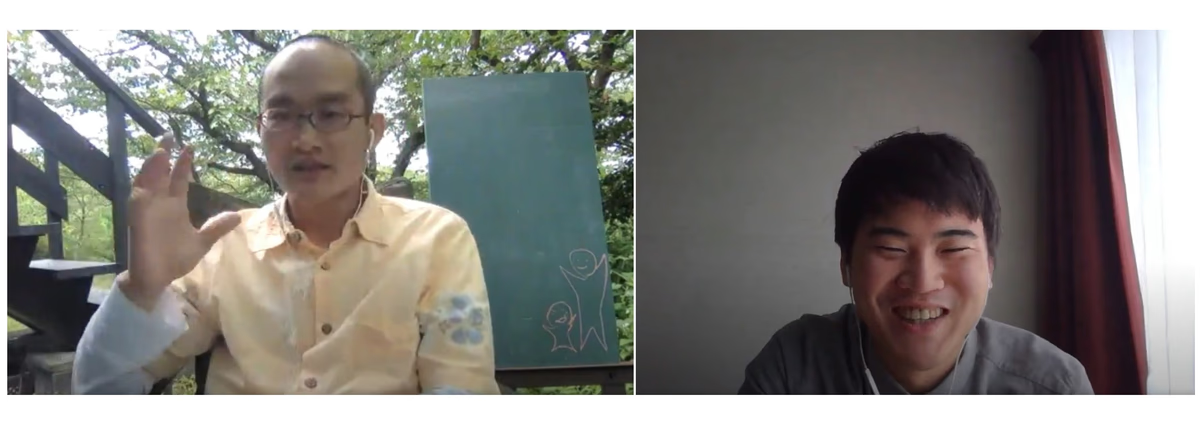
原澤と青木さん。横浜と淡路島をオンラインでつないでインタビューを行いました。
ーーうーむ。それってすごく楽しそうですけど、作っていく側って大変だしすごくエネルギーを使うし、やっているうちに目的とか見失ってしまうんじゃないかって思うんですけど。
青木:うん、よく見失っている。大丈夫(笑)。毎朝起きて「俺は何のために生きているんだ?」って思ってるから。
ーーええっ!意外です。
青木:全然、計画立てていないので。世の中でよく、ビジョンとか、5年計画とか作る人いるけど、僕はまったくできないほうです。
受け仕事と主催仕事のバランス。今日死ねるかどうかで考える。
ーー私もよく迷うときがあって。迷わないようにするために仕事をつめこんだりしがちです。
青木:僕もやりがち、同じタイプ。仕事で支えられている感じ。
ーー仕事って2つタイプがあると思うんですけど。「どんな仕事にしたいか」を考えるタイプと、やることが決まっていていかに効率的にやっていくかみたいなタイプ。そのバランスを取るのが難しくて。決められた仕事で不安を埋めようとしてしまうときがあります。青木さんにもそんな不安があるんですか。
青木:あります。受け仕事のほうがリスクも少ないし、言われたことをやっていればお金が入ってくるから楽なんだよねすごく。でも、それでいいのかな?みたいな、自分のリスクで、自分で考えて自分で作るみたいなのもやってみたいエネルギーがもたげ上がってくるみたいな感じもある。人間だから両方あるんだと思う。
人によって、仕事と趣味でバランス取ったりする場合もあるし。お仕事の中にその両方を内在化させていくこともあると思います。人間はどっかでバランスとりたい生き物なので。
ーーその辺のバランス感覚がまだまだ難しいです。どうやって青木さんはそのバランスをとっているんですか。
青木:僕は、受けてもないのに自分で作る仕事をときどき挟んだほうが調子がいい。キャットフードばっかり食べている猫が、たまに草を食べに行くみたいな。
誰にも頼まれないのに、自分で何か企画をして、お金のことを決めて、自分のリスクで主催する仕事をつくることも、自分の中でのバランスをとることですね。
僕、会議ファシリテーターを20年くらいやっているんですけど。コロナの影響で会議室に人が集まらなくなったので、僕の仕事はなくなっちゃったわけ。4月1日に実質上のファシリテーター廃業宣言をして、オンライン会議ファシリテーターとして出直したんです。
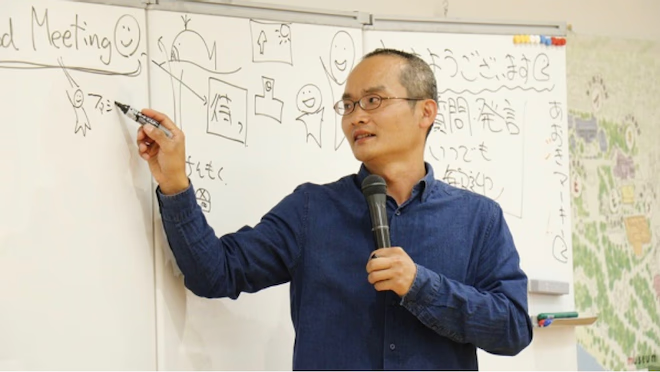
会議ファシリテーターとしてお仕事をする青木さん。
青木:オンラインファシリテーターとして出だしの時はだれも僕に仕事を発注しないから、昔の友達とオンラインで対談したりオンラインワークショップをやったり、主催側をどんどんやる。「オンラインでもこんなのできるよー」ということをすると、「じゃあ青木さんに仕事をお願いしましょう」と受け仕事が増えてきます。
主催っていうのはある種の営業。「こんなことできます」「こんなこと考えています」「こんなことで役に立ちたい」と発信するとオーダーが来ます。で、オーダーが増えると忙しくなってきてありがたいなと思うんだけれども、「ちょっと待てよ」と。「今、俺が本当にやらなければいけないのは何だっけ?」と振り返らざるを得なくなるわけですよ。
それで、今朝も「これじゃあだめだ。今やらないといけないことをしないと後悔するなあ」って、がばっと4時半に起きて。スティーブ・ジョブスは「もし今日が自分の人生最後の日だとしたら、今日やる予定のことを私は本当にやりたいだろうか?」って鏡を見て考えたっていうよね。今朝、僕が「もし今日が人生最後の日だとしたら?」と思って考えたのは、「コロナから学んだことはなんですか?」というワークショップをしなくちゃいけないということでした。
せっかく経済が一回止まって、みんながいろんなことから降りて、会社や学校へ行かなくなって、家にこもって何かしら感じたはずだよね。それが、緊急事態宣言が解除されると、「学校へ行こう、仕事へ行こう」みたいな感じで復活しつつあるけれど、今このタイミングでコロナから何を学んだのかをおさらいしておかないと、大事なことを逃しちゃうなと思って。
それは誰も僕に発注してくれない仕事です。今朝は「いつどこで開催しよう」と、企画書をばーっと書いて「ああ満足!」みたいな感じ。そんなふうに、バランスをとっていますね。
ーー私は、バランスがとれているのかどうか、自分でわからなくなることがあるんですよね。たぶん、自分が主催者になってやる仕事について、まだ”主催”になりきれていない部分があるのかなと思っていて。自分のものにしていくためにも、もっとバンバン青木さんのように日々自分に問いかけて、本当にしたいことをもっとやらなきゃいけないなと思います。
青木:ぜひやってみてください。その本気度が、仕事の質にも影響すると思いますので。自分の人生をかけてやるプロジェクトとして本気で思ったら、もっと面白くなる確率が高まるよね。エネルギーがこもるので。
ーーただ、受け仕事は受け仕事で求められていることだし、それをやることも大事かなと思っているんです。逃げているとは思いたくないけれど、どうしてもみんな、そっちで物理的に手が埋まってしまうことってあるんじゃないかと。そうすると自分が”主催”になることがおろそかになっていく。そうならないためのテクニックがあれば聞きたいです。
青木:鏡にむかって「これで死んでいいんだっけ?」と聞いてみることです。それで満足して死ねるならいいんですよ。受け仕事職人も必要なことだし立派なこと。自分の内側にもし「それではいけない」ってのが上がってくるなら、その声を聞かないと死に切れないよね。
ーーあるにはあるんですが、その声がちょっと自信なさげな声なんですけど。
青木:あはは(笑)、いや、わかります。それも。
ーーもうその声をちょっと聞けるようになります。
青木:他人の声を聞きすぎると間違えることがあるけれど、自分の声を聞いている限りはそんなに間違えないと、今のところ僕は理解しています。
青木さんは「お麩」になりたい!? 「働く」とは「自分が機能する」こと
ーーところで青木さん、好きな食べ物をプロフィールに書かれていますよね。いか、こんにゃくとか。
青木:いか、こんにゃく好きですね。
ーー「淡白な食べ物が好き」って何かでみたんですが、それって青木さんの性格と関連している気がしています。ちょうどいい感じでそこにいてくれるような印象がすごくあって。好きな食べ物を見たときに、青木さんを表している感じがしました。
青木:お麩とかも好きです。すき焼きの中だったら一番お麩になりたい。
あらゆる美味しい成分をそのなかに吸収できる存在として。すべてのおいしいものを吸収して、みなさんのお口に入りたい。若い頃は唐辛子な感じの存在感だったし。歩くナイフとも呼ばれた。辛いものが好きでしたね。今でも辛いもの、好きですけど。
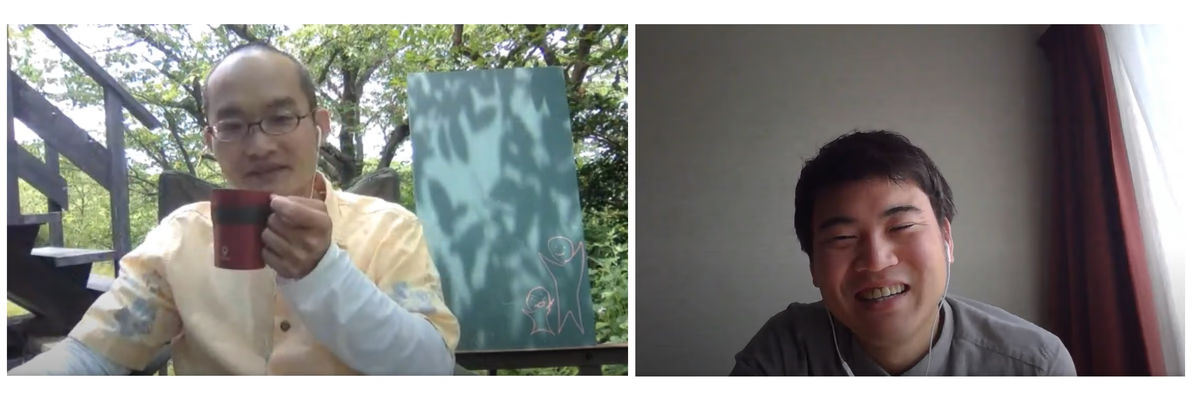
好きな食べ物の話から、まさかの展開に。
ーーそれがいまは、お麩……。
青木:仕事とか、機能としてそっちのほうが居心地が良かったり、よく働けるかんじ。働くって、自分が機能しているかどうかだと思うので。「ああよく働けたな、満足した」っていうのは僕の持つ力とか特性を十分に出し切って、「もう今日はこれで死んでいい」と思えるように仕事をしようとしています。
死ぬって重要なテーマで。一本一本仕事を始めるときに、「ああ、今日これで青木将幸最後の仕事だったなあ」となってもいいようにやりたいんですね。いつが最後か自分で決められないので。
ーー今日死んでもいいというところにやや唐辛子感を感じましたが……。青木さんが、唐辛子からお麩に変わっていった「プロセス」を聞いてみたいです。
青木:もともと唐辛子なんですよ。冷たく鋭く人にあたる。野生のままだとそういう機能だったんですけど。それであまりに多くに人を傷つけてきたというのが実体験としてあり。傷つけるのは得意なんだけどあんまりよくないなとも感じていました。充分に人を切ってきたので、もうその刀はおさめていいなっていう感じです。
ーーそんな唐辛子な青木さんは想像できないです。
青木:僕の若い頃を知っている面々には、「昔のマーキーはほんとに怖かったけど、なんでそんなに丸くなっちゃったの?」ってよく聞かれます。それはなぜなのかは……。そうだな、えーー……。
学生の頃は、「世の中に革命を起こそう!」みたいな感じだったんですけど、その頃の仲間に僕の兄貴分みたいな人がいて。その人と一緒にファシリテーターの入り口を作った感じがあるんです。
彼はお酒が好きな男でね。よく飲み屋に連れて行ってくれて、人生を語るわけ。いろんなことを教わったし大好きだったんだけど、彼はアルコール依存症みたいになっていってしまったんです。あるとき、ファシリテーターとしてペアで仕事をするときに、そいつがお酒を飲んでから仕事に来ちゃったので、僕がえらい怒って問い詰めて、強く当たったんだよね。まだ唐辛子だったから。
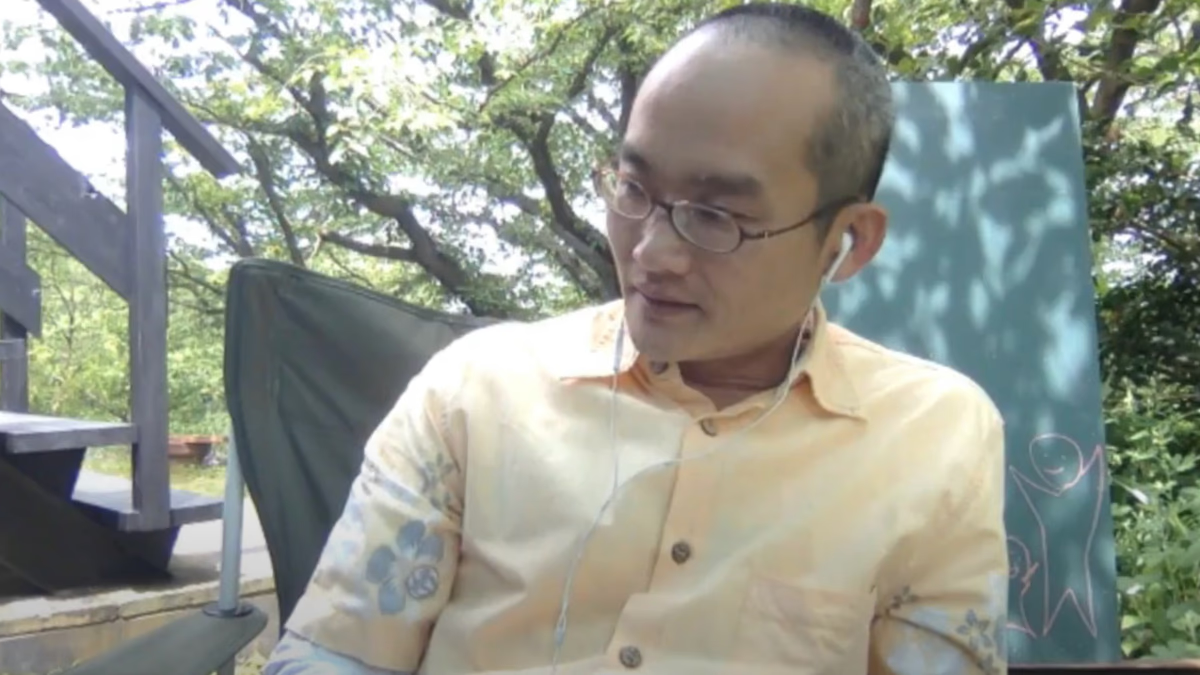
ゆっくりと、当時を思い出しながら話をする青木さん。
青木:そしたらそいつは、少ししょげて僕と仕事ができなくなっていって……。袂を分かって違う道を歩むみたいになりました。その後の彼は、仕事を失って世間から遠ざかっていったんだけど、その引き金を僕が引いてしまった感じがあって。やがて体を悪くした彼は糖尿病になって、仕事もなく社会との関わりも減ってうつ病みたいになって、最後死んじゃったんだよね。
僕には彼を救いたい気持ちもあったけれど、彼のSOSをうまく聞けずに死なせてしまったと受け取っていて。ちょっとこれは、唐辛子人生ではいけないと思ったんです。
志が近くて仲間だと思っていたやつと、何かでパンと離れたあと関係を修復できなかったり、別れてしまったり、そいつのことを聞けなかったりしたのは、自分に何かが足りなかったんだなと学ばざるを得なくて。人の話を聞くってどういうことだろうというのを鍛え直したりとか、自分のあり方を見つめ直していくなかでの「お麩」ですね。
で、面白いことにその事件が起きてから、僕はファシリテーターとして一人前になっていくんだな。
ーーもし今仕事仲間がお酒を飲んできてしまったら、どう対応しますか?
青木:仕事のパートナーとしては怒るけれど、カバーはじゅうぶんにできると思っていて。
「酔いが覚めるまで外れていてくれ。それまで俺がつないでいるから」みたいな動きもできるし。お客さんに説明が必要なら、「相方が飲んできちゃってすみません」て言って始めることもできるよね今は。お麩だから。その状況を受け入れられるんですよ。
「今日は飲んでいるファシリテーターと、飲んでいないファシリテーターでお送りします〜」とも言える。それで場は成立する。そうできていたら、あいつを死なせることはなかったけれど、当時の僕はもう少し未熟で、もう少し唐辛子だったのでそれはできなかったね。
ーー私も、一緒に仕事するパートナーに対して、「それってどうなの?」ってときに強く当たったり、喧嘩しちゃったりすることがあります。
言いたいことを言える関係性はいいけれどぶつかったままになったときって、なんとかしたいなって思っていて。青木さんのように、周りを吸収して収めるっていうのは難しくて、いったいいつできるんだろうって思っています。
やっぱり青木さんとは安心して話ができるなあと、ゆったりとした心地の良い時間はあっという間に過ぎていきます。
ここまで主に青木さん自身のことについて話を聴いてきましたが、働くことにおいて日々不安を感じていたり、もともと鋭い性格だったりと、青木さんの意外な一面をみることができました。
後編では青木さんのオンライン・ファシリテーターとしてのお仕事にフォーカスし、より深く「はたらく」についてインタビューしていきます。
